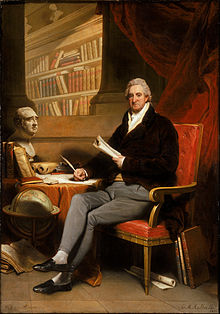William Roscoe
| William Roscoe | |
|---|---|

William Roscoe portrayed by Martin Archer Shee, 1815-1817
|
|
| Born | 8 March 1753 Liverpool |
| Died | 30 June 1831 Unitarian Grave Yard, Mount Pleasant, Liverpool |
William Roscoe (8 March 1753 – 30 June 1831) was an English historian, leading abolitionist, art collector, M.P. (briefly), lawyer, banker, botanist and miscellaneous writer, perhaps best known today as an early abolitionist and for his poem for children The Butterfly's Ball, and the Grasshopper's Feast.
He was born in Liverpool, where his father, a market gardener, kept a public house called the Bowling Green at Mount Pleasant. Roscoe left school at the age of twelve, having learned all that his schoolmaster could teach. He assisted his father in the work of the garden, but spent his leisure time on reading and study. "This mode of life," he says, "gave health and vigour to my body, and amusement and instruction to my mind; and to this day I well remember the delicious sleep which succeeded my labours, from which I was again called at an early hour. If I were now asked whom I consider to be the happiest of the human race, I should answer, those who cultivate the earth by their own hands." At fifteen he began to look for a suitable career. A month's trial of bookselling was unsuccessful, and in 1769 he was articled to a solicitor. Although a diligent student of law, he continued to read the classics, and made the acquaintance with the language and literature of Italy which was to dominate his life.
In 1774 he went into business as a lawyer, and in 1781 married Jane, second daughter of William Griffies, a Liverpool tradesman; they had seven sons and three daughters. Roscoe had the courage to denounce the African slave trade in his native town, where, at that time, a significant amount of the wealth came from slavery. Roscoe was a Unitarian and Presbyterian. His outspokenness against the slave trade meant that abolitionism and Presbyterianism were linked together in the public mind.
In 1796 Roscoe gave up legal practice, and toyed with the idea of going to the bar. Between 1793 and 1800 he paid much attention to agriculture, and helped to reclaim Chat Moss, near Eccles, Lancashire. He also succeeded in restoring to good order the affairs of a banking house in which his friend William Clark, then resident in Italy, was a partner. This led to his introduction to the business, which eventually proved disastrous.
...
Wikipedia
